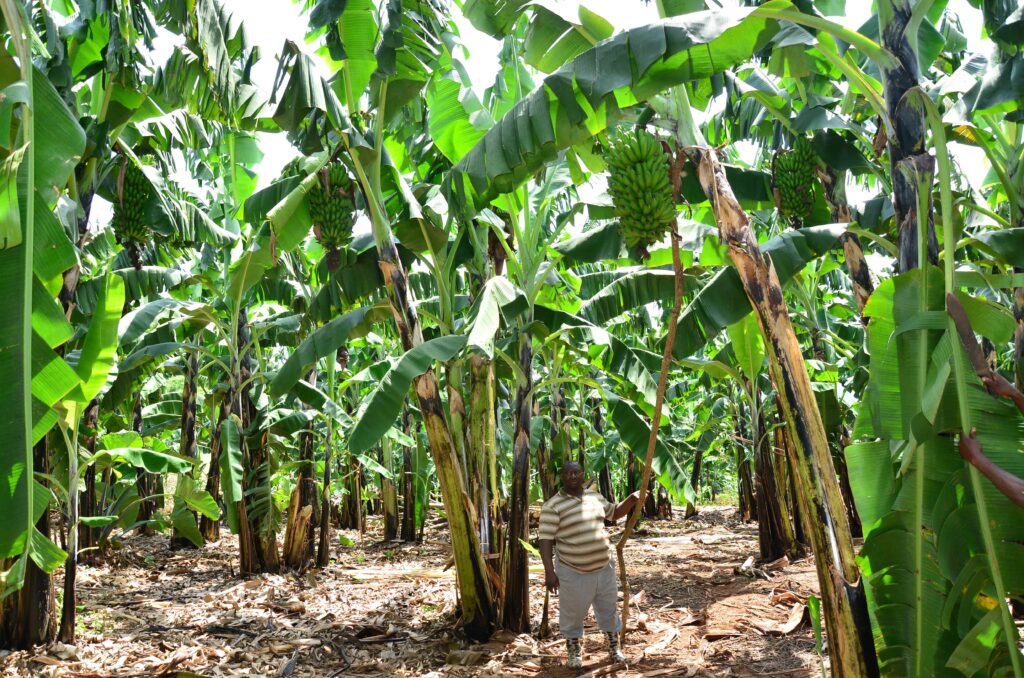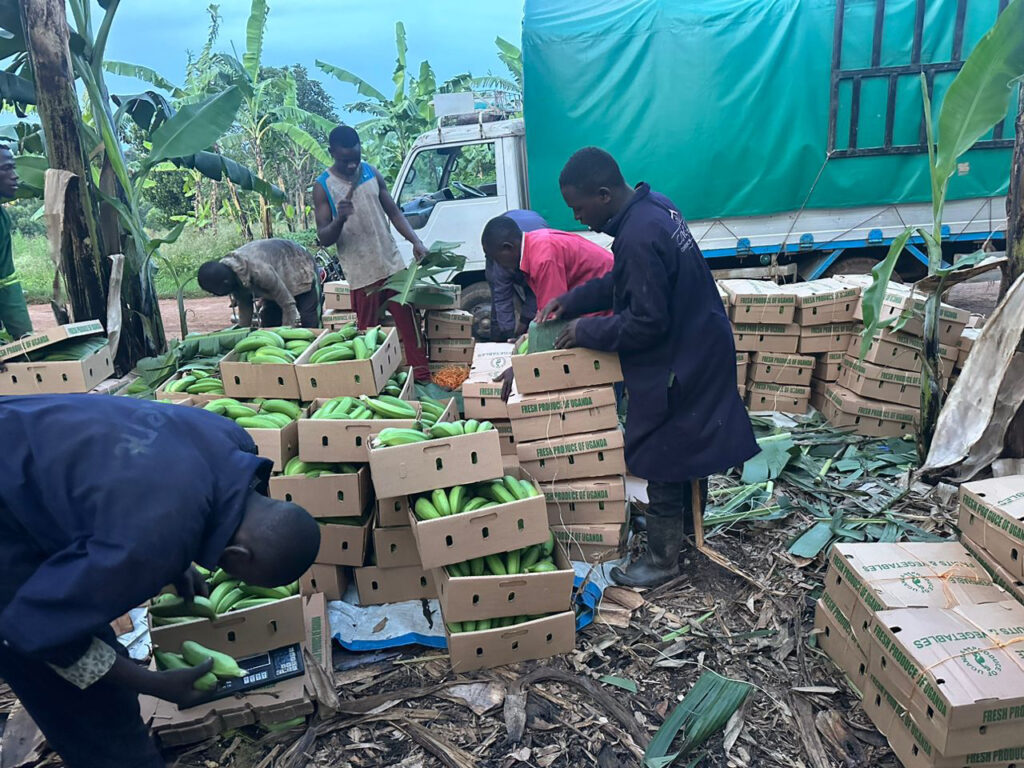By Herbert Musoke
For the ninth year running, Vision Group, together with the Embassy of the Netherlands, KLM Airlines, dfcu Bank and Koudijs Nutrition BV, is running the Best Farmers Competition. The 2024 competition will run from April to November, with the awards in December. Every week, Vision Group platforms will publish profiles of the farmers. The winners will walk away with sh150m and a fully paid-for trip to the Netherlands.
In 1983, six young brothers moved from the Mufumbiro mountain ranges in Kisoro district to Lwengo and then Masaka district in search of work on people’s plantations to earn a living.
Little did they know that today they would be feeding Greater Masaka and the world from a 100- acre banana plantation, supplying both export and local markets.
Joshua Maniragaba says together with his five brothers — David Ssebikaali, John Majimbiri, Emanuel Sinunvayabo, Sunday Samuel and Eliya Kasimba — they moved to Lwengo looking for work.
There, they worked as casual labourers; digging for farmers, especially those with banana plantations. Today, the six brothers, now directors of the farm, along with Maniragaba’s son, James Nsenga, own a 100-acre banana plantation in Busumbi-Bijaba village, Kyazanga sub-county in Lwengo district.

From this plantation, they harvest over 1,000 bunches of matooke every 15 days, which they pack and export to Europe.
To sustain their market, they established the Makondo Integrated Sustainable Agriculture Parish Entrepreneurship Learning Association. Their goal is to educate and train, especially the youth, in farming as a business.
The genesis
Maniragaba says when they arrived in Lwengo, they had nothing to their names, not even relatives to start with. Therefore, they had to engage in hard labour to survive, but they had a goal of improving their lives and securing a better future for themselves and their children.
“We were ambitious and had a clear vision of where we wanted to go. In 1985, we purchased our first plot (kibanja) of about one acre at sh45,000, using earnings from working on people’s coffee and banana plantations,” he recalls.
With this, they established their home and first plantation by 1990. They continued working for others and gaining valuable experience in managing banana plantations.
“We then purchased more land, and today we own over 100 acres, with a well-established banana plantation covering 100 acres. We are still acquiring and developing banana plantations because our goal is to have over 500 acres,” he says.
The banana plantation
John Majimbiri says when they established the plantation in 1990, they initially planted local varieties because improved suckers were not readily available. These varieties offered tasty food and were resilient to harsh climatic conditions.

“However, in the 2000s, when we entered the export market, we focused on the kibuzi variety. This variety takes longer to ripen, making it suitable for shipping and it produces large, tasty bunches and is resistant to harsh climatic conditions,” he explains.
The area where their plantation is located is rocky, with predominantly murram soils. Therefore, they prioritise soil fertility before planting to ensure optimal growth and higher-yielding bunches.
“We use cow dung to improve the soil fertility. We typically prepare plots of 20 acres. After clearing, we apply dung and plant beans. The following season, we dig holes measuring 3ftx3ft, spaced 10ft apart, allowing for 400 plants per acre,” Majimbiri adds.
Due to the area’s frequent droughts, they employ mulching on the plantations to retain soil moisture and suppress weed growth. They acquire mulching materials at a cost of sh500,000 annually.
“We invested in a truck to transport dung and mulch. To ensure accountability, we calculate transportation costs; a trip for dung costs sh600,000 and for mulch, sh150,000,” he says.
Harvest
Maniragaba says from their 100- acre plantation, they harvest over 1,000 bunches of matooke every 15 days.
Each bunch sells for between sh10,000 and sh15,000, but for the export market, they sell in kilos at sh1,400 per kilogramme.
“We have buyers who purchase directly from the farm, but much of the matooke is exported. We take meticulous care of our plantation to ensure the bananas are large and free of blemishes. Buyers come to the farm, package them in boxes and transport to the airport,” he says.
A single kibuzi bunch can weigh over 70kg. This translates to earnings of sh98,000 per bunch, considering the price per kilo at sh1,400.
“We are seeking additional markets because the export market alone cannot absorb all our matooke. If we can establish partnerships with institutions such as hotels, we could supply them matooke,” he adds.
Security
Nsenga says initially, they faced a challenge of theft of their matooke. To address this, they developed a system where they divided the plantation into plots of 20 acres.
Each plot has a house and specific workers are assigned responsibility not only for tending to the garden but also safeguarding the matooke.
Workers
Sinunvayabo, one of the farm directors, says they employ over 60 workers. Some are permanent and receive salary of sh150,000 per month, along with accommodation and medical care.
Others are casual workers whose pay varies based on their tasks, ranging from sh5,000 to sh20,000. Tasks include cutting grass for mulching and loading.
“We are also employees of the farm because we are fully engaged in its daily operations. We pay ourselves sh2m each month, which we use for personal expenses such as supporting our families and leisure activities,” he says.
Cocoyams
Cocoyam, known locally as obukupa, is a tuber crop prominent in Buganda, traditionally grown as a reserve food during times of famine.
Maniragaba says in the past, they experienced prolonged dry spells, leading to famine. During this time, they had to spend a lot on feeding workers, which affected their sales.
“In search of solutions, we discovered that cocoyam can be grown easily. It lasts long in the soil without rotting and even after harvest,” he says.
Initially cultivated to feed their workers, cocoyam became a business enterprise crop in 2018, when they found a market for the tubers.
Maniragaba says cocoyam is easy to cultivate and they intercrop it with the bananas and matures in three months.
“Last year, we earned sh35m from cocoyam,” he adds.
Book keeping
Maniragaba explains that as a registered entity, they are required to maintain comprehensive records.
“Our records encompass activities such as land preparation, planting, harvesting, mulching, fertiliser application, salary payments and transportation,” he says.
Financial management is structured to ensure the business not only sustains itself but also supports future expansion.
Revenue is deposited in the farm’s bank account and the directors adhere to the agreed salary of sh2m.
“This has enabled us to assess the farm’s performance to determine profitability and guide future plans.”
Impacting community
Maniragaba says they provide opportunities for people to learn optimal agronomic practices to enhance yields on their farms.
This initiative aims to increase incomes and improve living conditions for participants.
“Initially, we used to distribute free suckers, but we discontinued this practice because recipients often neglected the plants since they had not invested in them. Now, we require recipients to pay for the suckers, encouraging them to care for the plants after investing in preserving their own money,” he says.
Challenges
Maniragaba says their biggest challenge is the market. Despite increasing production, they face uncertainty in finding sufficient market outlets for their produce.
Plans
They are continuing to expand their acreage and Nsenga says they intend to establish a cold room for storing packaged matooke before it is exported.
Additionally, they plan to peel the matooke and market peeled bananas, aiming to supply local markets such as supermarkets as a strategy to broaden their market reach.
Family involvement
Maniragaba says their farm operates on strong family values and principles, with all family members actively involved.
Today, their son, James Nsenga, who holds a bachelor’s degree in surveying from Makerere University, serves as the operations manager, ensuring the farm’s continuity.
Nsenga recalls growing up and witnessing his parents’ ability to earn from farming, which funded his education and other necessities.
“This experience made me realise the profitability of farming as a business. So, I decided to join my parents in their work. Although I occasionally handle surveying jobs related to my profession, I always return to the farm,” he says.
Nsenga encourages his siblings and others to view farming as a lucrative investment opportunity, emphasising that it can provide a decent living compared to the increasingly scarce formal job opportunities in Uganda.
What others say
Ali Kiwanuka, area councillor
At one time, these brothers were workers on my father’s farm. Witnessing their transformation from employees to bosses has been truly inspiring.
Their journey is a living testimony that with determination, anything is possible and one can transform their life through farming as a business.
Their success underscores the importance of innovating and approaching challenges with intelligence and creativity. It shows that by doing things differently, remarkable achievements can be realised.
Charles Lwanga, Deputy RDC of Lwengo District
We are grateful to these brothers for setting a positive example for the people of Lwengo. They have shown that farming can be a profitable business capable of transforming lives. Instead of selling land and migrating to towns and investing in bodabodas, people can follow their lead and venture into farming. This path offers the opportunity to live a dignified and prosperous life while contributing positively to the community and economy.





